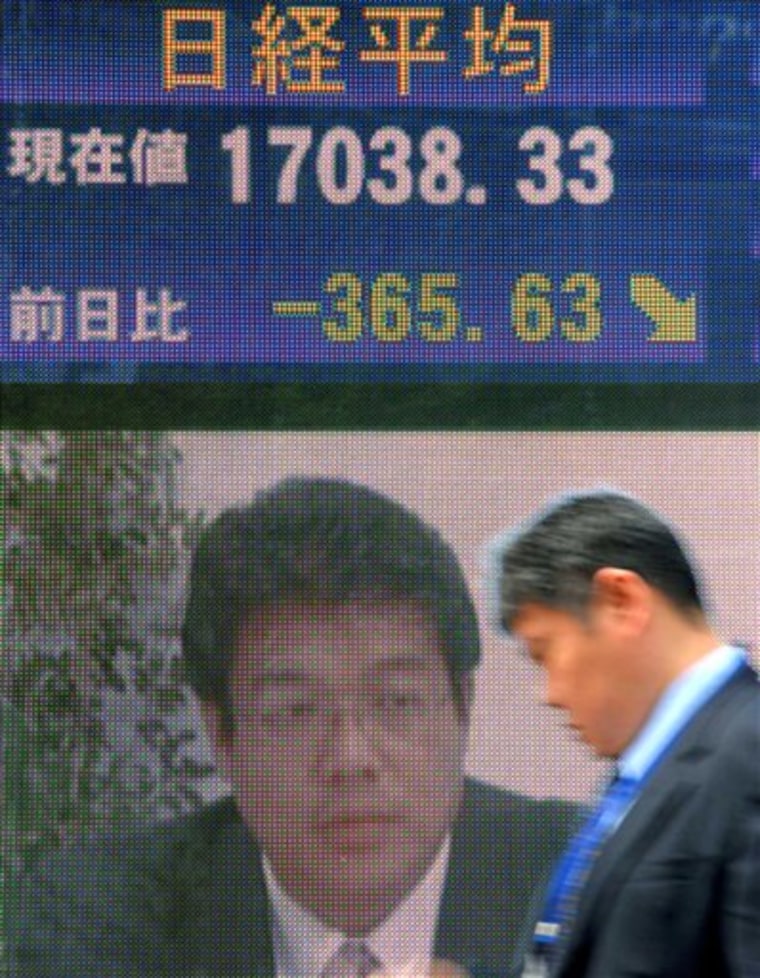Japan’s benchmark stock index tumbled 2.8 percent Monday, its biggest one-day drop since January, as the yen’s surge prompted investors to dump major exporters like Honda and Sony.
The Nikkei 225 index fell 489.56 points to 16,914.40 points, the lowest close since March 28.
In percentage terms, it was the biggest drop since Jan. 18, when the market fell 2.9 percent. By points, it was the largest decline since May 10, 2004, when the index lost 554.12 points.
Stocks fell in reaction to the surge in oil prices and the yen, which gained after senior finance and central bank officials from the world’s largest economies ended their meeting in Washington on Sunday with a call for China to allow its currency to strengthen.
That prompted traders to buy the yen due to Japan’s regional proximity to China. The stronger yen hurts Japanese exporters by making their products less competitive and eroding revenue when converted back to yen.
The dollar fell 2.57 yen to 115.04 yen on the Tokyo foreign exchange market by late afternoon Monday, compared to its close at 117.61 yen in New York Friday, dipping as low as 114.86 yen — the lowest level since Jan. 25. The euro rose to $1.2382 from $1.2340.
Investors’ caution about buying too aggressively ahead of earnings reports from Sony Corp. and other major Japanese firms later this week also accelerated the Nikkei’s losses, traders said.
“Those negative factors such as the yen and oil prices came up all together,” said Teruhisa Ishikawa, investment information manager at Mizuho Investors Securities.
Honda Motor Co. fell 3.69 percent to 7,820 yen ($67.41) and Toyota Motor Corp. declined 2.75 percent to 6,710 yen ($57.84). Sony ended down 2.93 percent at 5,970 yen ($51.47) and Canon Inc. posted a 2.04 percent drop at 8,650 yen ($74.57).
Banks and telecommunication issues also declined, with Mizuho Financial Group Inc. falling 1.51 percent to 976,000 yen ($8,413.79) and NTT DoCoMo Inc. losing 2.82 percent to 172,000 yen ($1,482.76).
But Hiroshi Okuda, chairman of Japan’s most powerful business lobby, the Keidanren, brushed off Monday’s losses.
“The drop in share prices can be attributed to various factors. But with businesses posting strong performances, most of us hold optimistic views of the future,” Okuda told reporters Monday afternoon.
Traders said some investors turned bearish over political uncertainty in Japan after a candidate supported by Japan’s main opposition party won Sunday’s hotly contested by-election just outside Tokyo.
The vote was seen as a barometer of public sentiment amid a widening gap between the nation’s rich and poor, which many attribute to Prime Minister Junichiro Koizumi’s structural reforms.
First-section volume rose to 1.823 billion shares, from Friday’s 1.755 billion shares. Decliners beat advancers 1,596 to 82, while 16 issues were unchanged.
The broader Topix index, which includes all shares on the market’s first section, was down 45.64 points, or 2.60 percent, at 1,710.76 points Monday.
The yield on the 10-year Japanese government bond fell to 1.8900 percent from Friday’s close at 1.9050 percent. Its price rose 0.12 to 99.24 points.
The yen’s volatility prompted the Finance Ministry to say it would act against excessive exchange rate movements.
“We can see rough movements (in the yen’s exchange rate) based on speculation related to the Group of Seven meeting at the weekend,” Vice Finance Minister Koichi Hosokawa said at a regular press conference.
Japan’s currency authorities are “always ready to act” against excessive volatility in the market, Hosokawa said.
